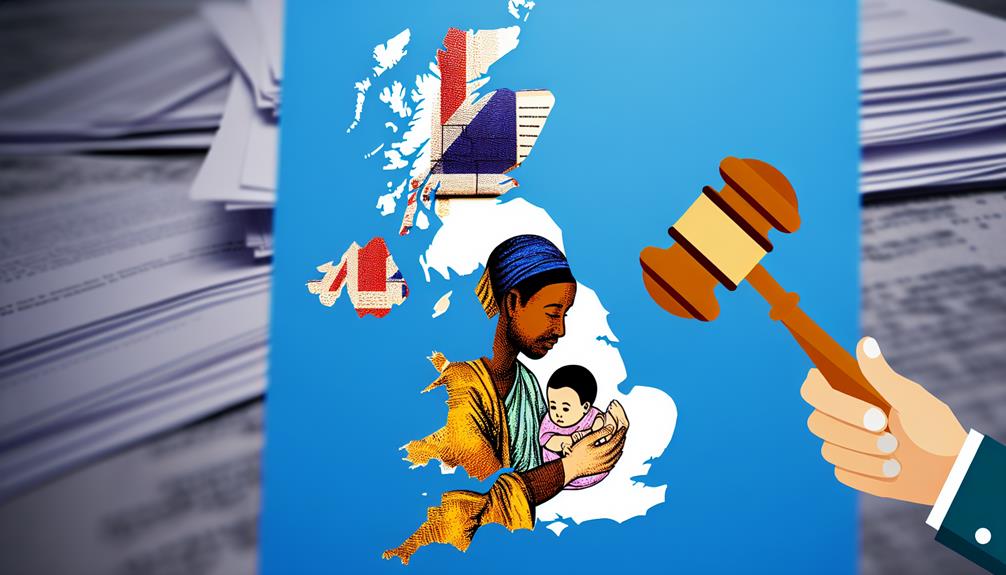In the UK, fostering provides a safe home for about 65,000 kids. However, policies can be complex. If you're over 21 with a secure home, you can apply. You'll undergo health assessments and demonstrate you can safeguard a child's rights. Support is offered, including financial aid and counseling. Local authorities, in the meantime, guarantee kids' safety and manage resources. They also provide training for carers. Potential foster parents face rigorous evaluation. As you journey onwards, you'll learn this system's challenges, like policy loopholes and underfunding, and how they impact a child's experience, debunking myths along the way.
Key Takeaways
- The UK foster care system requires foster carers to be over 21 with a spare room and able to provide a safe environment.
- Foster carers have legal adoption rights and responsibilities, including providing a safe, nurturing environment and meeting the child's health, educational, and emotional needs.
- Local authorities play a crucial role in placing, supporting, and supervising foster children, dealing with funding issues, and providing training for foster carers.
- The evaluation process for prospective foster parents is thorough, focusing on their parenting skills, previous foster experience, and the safety and suitability of their home.
- There are several challenges in the UK foster care system, including policy ambiguities, financial constraints, and inefficient procedures in placing children into foster care.
Overview of the UK Foster Care System

The UK's foster care system, a intricate network of policies and practices, offers a critical safety net for children in need of temporary, safe housing. You'll find that this system caters to a wide range of situations, from cases of abuse to instances where parents can't provide the necessary care. Understanding the system's intricacies requires a grasp of its statistical landscape.
Digging into the foster care statistics, you'll find around 65,000 children living with nearly 55,000 foster families across the UK. These figures highlight the system's reach and impact. However, it's not without its challenges. A shortage of 8,600 foster families persists, indicating a stark gap between need and availability.
Adoption alternatives play a vital role in the system, offering permanence for children who can't return to their birth families. These alternatives include long-term foster care, special guardianship, and adoption itself. Each comes with its own set of regulations and implications.
In your pursuit of mastery, understanding these aspects of the UK's foster care system is crucial. As we explore further, you'll gain an in-depth understanding of its strengths, weaknesses, and potential for reform.
Understanding the UK Foster Care Policies
To comprehend the UK's foster care policies, you'll need to scrutinize three key aspects:
- Eligibility criteria for fostering
- Rights and responsibilities
- Support for foster carers
Each of these areas is integral to the functioning of the system and your understanding of how it operates.
Eligibility Criteria for Fostering
In order to become a foster carer in the UK, you'll need to meet certain eligibility criteria, carefully established to guarantee the safety and well-being of the child.
Contrary to foster care myths, anyone over 21, regardless of marital status, sexuality, or home ownership, can apply. Importantly, you must have a spare room and the time and commitment to care for a child.
Cultural considerations are also key; you should be open to understanding and respecting the child's cultural, religious and linguistic background. Criminal records are assessed, but don't necessarily disqualify you.
Your physical and mental health must be good, but disabilities aren't automatic disqualifiers. Fundamentally, eligibility focuses on your ability to provide a safe, nurturing environment.
Rights and Responsibilities
Having met the eligibility criteria, you're now ready to explore the rights and responsibilities that encompass UK's foster care policies. As a foster carer, your adoption rights are enshrined in law, allowing you to adopt your fostered teenagers should the circumstances permit. However, these rights come with the responsibility to provide a safe, nurturing environment that supports the child's development.
Importantly, you're responsible for meeting the child's health, educational, and emotional needs. Remember, fostered teenagers also have rights, including the right to be consulted on decisions affecting their lives and to have their cultural, linguistic, and religious upbringing respected. Dealing with these rights and responsibilities may seem challenging, but they're designed to protect all parties involved, ensuring the best possible outcomes.
Support for Foster Carers
As a foster carer in the UK, you'll find an array of support mechanisms in place, designed to help you navigate the challenges and complexities of fostering. The system aims to address issues such as 'Carer Burnout' by providing counselling services, peer support groups, and continued training. These not only offer emotional backing but enhance your skills and knowledge too.
Further, the system acknowledges the 'Financial Implications' of fostering. You'll receive a fostering allowance, intended to cover the child's needs. This financial support, coupled with tax relief schemes, aims to alleviate monetary strain. Additionally, the local authority may offer discretionary payments for specific needs or circumstances. Understanding these provisions can help you effectively manage the foster care journey.
The Role of Local Authorities in Foster Care
Local authorities shoulder a significant responsibility in the UK's foster care system, playing an essential role in the placement, support, and supervision of foster children and their carers. Their authority accountability extends to guaranteeing that all children in their care receive a safe, nurturing environment. This involves thorough checks on potential foster homes, regular monitoring of children's wellbeing, and close collaboration with foster carers to address any issues that arise.
Yet, local authorities also grapple with funding issues. The financial resources required to provide extensive support services are substantial. They're tasked with spreading resources strategically, ensuring every child in their care receives the necessary support, all while operating within their budget constraints.
In addition to this, local authorities are responsible for training and supporting foster carers, offering guidance to help them navigate the complexities of fostering. They also play a crucial role in coordinating with other services, including health and education, to ensure that foster children's holistic needs are met.
Evaluation and Approval Process for Foster Parents

In the domain of the UK's foster care system, the evaluation and approval process for potential foster parents is thorough and exhaustive. It is designed to ascertain their ability to provide a safe and supportive environment for foster children. This process delves into your parenting skills, previous foster experience, and overall readiness to take on the unique challenges that fostering entails.
The evaluation process includes:
- Scrutiny of Parenting Skills: You'll undergo an assessment that measures your ability to create a nurturing, stable environment, manage behavioral issues, and encourage the child's development.
- Inspection of Foster Experience: If you've fostered before, your track record will be reviewed. Your ability to manage the complex emotional, social, and educational needs of foster children is essential.
- Home Evaluation: Your home environment will be examined to ensure it's suitable for a foster child. It should be safe, secure, and have enough space for the child.
Rights and Responsibilities of Foster Parents
As we proceed with the topic of UK's foster care system, it's essential to understand your role as a foster parent.
You're not just responsible for providing basic needs, but also ensuring the child's overall welfare, which encompasses their physical, mental and emotional well-being.
Additionally, you're bound by certain legal obligations as a carer, which we'll unpack in the following discussion.
Legal Obligations of Carers
Delving into the legal obligations of foster parents reveals a balance of rights and responsibilities integral to the UK's foster care system.
Among these obligations, 'Carer's Compensation' and 'Foster Placement Stability' are essential.
- 'Carer's Compensation': You're entitled to a weekly fostering allowance. This isn't income but a reimbursement for costs incurred while caring for the child. It's tax-free up to certain limits.
- 'Foster Placement Stability': You're obliged to provide a stable and secure environment. This includes promoting the child's health, education, and social connections.
- Legal responsibilities: You must adhere to all foster care regulations and cooperate with social workers, respecting the child's legal rights.
Understanding these obligations ensures you're well-prepared for your important role in the child's life.
Ensuring Childs Welfare
Shifting our attention towards the welfare of the child, it's important to highlight that foster parents play a significant role in safeguarding and promoting the child's well-being. As a foster parent, you're responsible for the child's emotional health and employing trauma handling techniques when necessary.
Understanding a child's emotional state is key, especially if the child has experienced previous trauma. You're tasked with creating a supportive environment where the child feels safe and loved. Trauma handling techniques can be essential, such as providing a stable routine, listening attentively, and offering reassurance.
Support and Training for Foster Carers

In the domain of foster care, ongoing support and thorough training are vital for equipping foster carers with the necessary skills and resilience to handle the intricacies of their role. Carer resilience isn't just about emotional strength, but also about financial capability. Understanding the Foster Finances system in the UK can greatly help foster carers in managing their resources efficiently and effectively.
The UK government provides several support systems for foster carers:
- Training: This includes courses covering a range of relevant topics, from understanding the needs of the foster child to managing challenging behaviour. Regular updates and additional training are provided to guarantee carers stay well-informed and competent.
- Financial Assistance: Foster carers receive allowances to cover the cost of caring for a foster child. This assistance is essential in helping carers meet the financial demands of their role.
- Emotional and Psychological Support: Counselling and support groups are available for foster carers to deal with the emotional stress and challenges of their role.
The Childs Journey Through Foster Care
While support systems for foster carers play a significant role, it's equally important to understand the experiences of children as they navigate their journey through the foster care system. This journey can be a tumultuous one, clouded by foster care myths and complicated by the adoption shift phase.
Foster care myths often shape the child's journey negatively. You may hear tales of children shuffled from home to home, but statistics show most children experience only one to two placements within two years. The myth of children in care being 'damaged' or 'unmanageable' can also impact their self-esteem and opportunities for placement.
When a child is prepared for adoption, the transformation phase can be both exciting and challenging. It's a period of significant change where the child must adapt to a new family environment, potentially different routines, and possibly a fresh set of rules. This transformation can be emotionally taxing and requires careful management to support the child's wellbeing.
Understanding these aspects of the child's journey through foster care is fundamental for those involved in the system. By debunking myths and supporting shifts, we can better shape the child's experience and outcomes.
Key Challenges in UK Foster Care Policies

Exploring the labyrinth of UK foster care policies, you'll encounter a multitude of challenges that require urgent attention and resolution. These difficulties, often rooted in policy loopholes and financial constraints, hamper the system's effectiveness and demand astute analysis and strategic solutions.
Three major challenges that the UK foster care policies grapple with include:
- Policy loopholes: Ambiguities in the existing policies often lead to inconsistent implementation and oversight. This ambiguity leaves foster children vulnerable and hampers their wellbeing.
- Financial constraints: The foster care system is often underfunded, leading to inadequate resources for both foster families and children. This lack of funding strains the system and compromises the quality of care provided.
- Inefficient procedures: The process of placing a child into foster care can be lengthy and convoluted, causing unnecessary distress for the child.
Each of these issues poses a significant hurdle to the successful functioning of the UK's foster care system. By addressing these challenges head-on, you'll contribute to a more robust, effective, and caring system for all involved. Remember, the aim is to guarantee that every child in foster care receives the support, care, and love they deserve.
Frequently Asked Questions
What Are the Financial Implications for Foster Parents in the Uk?
As a UK foster parent, you'll receive a tax-free allowance, which varies based on child's age and needs. Additionally, you're entitled to tax benefits and free foster training to enhance your skills.
How Does the UK Foster Care System Compare to Those in Other Countries?
When you compare apples to apples, the UK's foster care system showcases unique strengths and challenges. Based on international comparisons, the system's effectiveness varies greatly, reflecting different societal norms, resources, and child protection philosophies globally.
How Does the Foster Care System in the UK Address Issues of Diversity and Cultural Differences?
In addressing cultural and diversity issues, the UK's foster care system employs diversity training and cultural sensitivity. They're ensuring carers understand and respect the unique backgrounds of each child they're tasked to nurture.
How Is the Mental Health of Foster Children Monitored and Managed in the UK Foster System?
In the UK foster system, they monitor your mental health through regular assessments. They'll use therapeutic interventions to support emotional resilience, ensuring you're not just surviving, but thriving in your new environment.
What Is the Impact of Brexit on the Uk's Foster Care System?
Brexit legislation's impact on UK's foster care is significant. You're seeing a potential decline in foster care recruitment due to uncertainties and changes in immigration policies affecting potential carers from EU countries.
Conclusion
Understanding UK's foster care system is imperative. From grasping policies, acknowledging local authorities' role, to comprehending approval processes for foster parents, it's a complex journey.
You've learned about foster parents' rights and responsibilities, the support available, and a child's journey in the system. Despite its challenges, remember, it's a system geared towards the welfare of at-risk children.
In essence, understanding this system is about understanding the commitment to protect every child's right to a safe, loving home.




